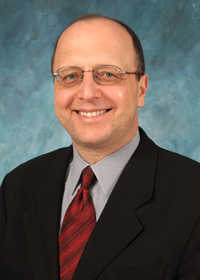 UNMC’s Pierre Fayad, M.D., shared results Saturday from the first randomized study that shows stenting is more effective than surgery for patients who were otherwise considered very high risk for standard surgery.
UNMC’s Pierre Fayad, M.D., shared results Saturday from the first randomized study that shows stenting is more effective than surgery for patients who were otherwise considered very high risk for standard surgery.
Dr. Fayad, Reynolds Centennial Professor and chairman of UNMC’s department of neurological sciences, is the only neurologist on the five-member executive committee, which helped design and organize the large trial. He shared the results of the study Saturday during the American Stroke Association’s 28 International Stroke Conference in Phoenix.
“This is a major advancement especially for a patients at high risk for surgery,” Dr. Fayad said.
SAPPHIRE study
The Stenting and Angioplasty with Protection in Patients at High Risk for Endarterectomy (SAPPHIRE) trial also combined stenting in the neck (carotid) arteries with an AngioGuard filter, a new device to prevent blood clots and other particles from reaching the brain and causing stroke.
Blockages in the carotid artery are generally treated with a surgery called carotid endarterectomy, in which the plaque buildup is removed. In carotid stenting, a balloon-tipped catheter is threaded into the artery, the balloon is inflated to push back the plaque and a mesh tube, called a stent, is inserted to keep the artery open.
Surgery and traditional stenting
Surgery and traditional stenting carry risks of creating blood clots or dislodging particles from the fatty deposits they are trying to clear. When such debris is unleashed and distributed it can travel to the brain and cause strokes, Dr. Fayad said. To reduce that risk during surgery, the artery is clamped while the atherosclerotic plaque is cut out. Stenting is done without stopping blood flow.
“In conjunction with neurologists, vascular surgeons and vascular interventionalists at UNMC provide carotid stenting to appropriate candidates,” said Jason Johanning, M.D., vascular surgeon, UNMC’s department of surgery. “Carotid stenting offers an improved outcome for patients who would otherwise be at too high a risk for standard surgery.”
Trials of carotid endarterectomy done in the late 1980s and early 1990s showed the surgery was extremely helpful for some patients, but it excluded patients at high risk of surgery, Dr. Fayad said. “We knew the benefits were there, but they were never tested in these patients,” he said. “This is the first trial that tackles this category of people.”
Patients at high risk of surgery include those with severe heart disease; those who have had radiation and narrowing, or blockage, of the arteries in the neck; those who already had a carotid endarterectomy and the blockage has returned; and anyone whose jaw would be dislocated during surgery.
Recent trials
The recent trial enrolled 723 patients over three years at 30 institutions. UNMC did not participate in the trial, which was sponsored by Cordis Corporation, a Johnson & Johnson company, which pioneers less invasive treatments for vascular disease.
The study results were first presented in November at the American Heart Association meeting. Complete results will be published after the patients have been followed for one year.
Executive committee
In addition to Dr. Fayad, the executive committee includes a cardiologist from the Cleveland Clinic, who serves as the trial’s principal investigator; a vascular surgeon from the Cleveland Clinic; a radiologist from the Miami Heart Institute; and a radiologist from the University of Pittsburgh.
Dr. Fayad’s research interests, publications
Dr. Fayad’s research interests include different aspects of the acute treatment and prevention of stroke and cerebrovascular disease. He served as a principal investigator, chairperson or committee member in several executive and safety monitoring committees for major multi-center and muti-national clinical trials in stroke and cerebrovascular disease.
Dr. Fayad has published numerous articles and book chapters in such journals as New England Journal of Medicine, Neurology, Stroke, Neurosurgery, and Journal of the American Medical Association. He is also a manuscript reviewer for several journals including Stroke, Journal of Clinical Epidemiology, Neurosurgery, Annals of Neurology, and Cerebrovascular Diseases.